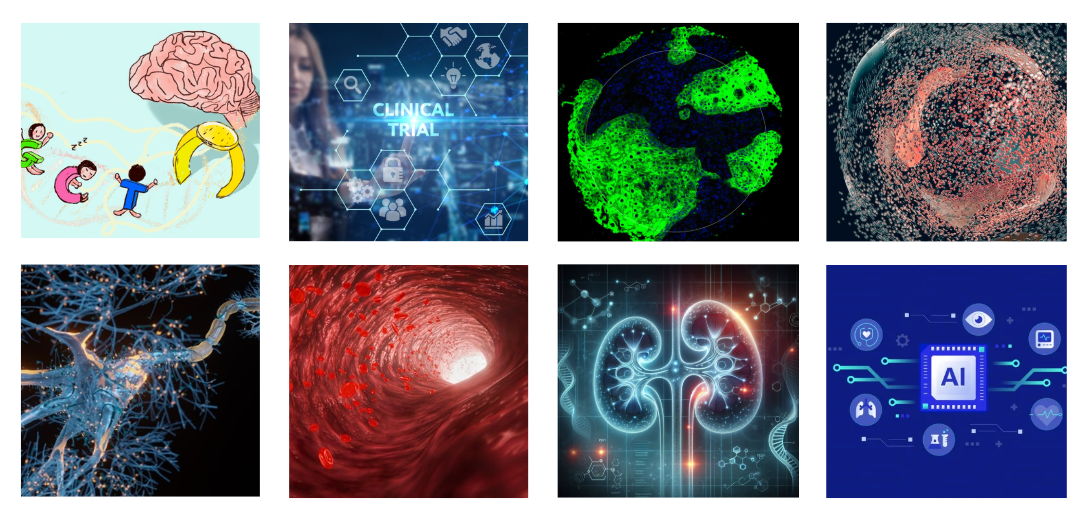Eight Translational Biotech Projects Selected for 2025 Blavatnik Accelerator Awards

The mid-cycle Blavatnik Accelerator Awards recognize eight Yale early-stage innovations tackling cancer, rare disease, and neurodegeneration through digital platforms, RNA therapies, and next-gen molecules.
The Blavatnik Fund for Innovation at Yale is pleased to announce the recipients of its 2025 Accelerator Awards, mid-cycle awards that support generating data for early-stage Yale life science research not typically funded by traditional research grants. This year’s awardees—eight research teams from across Yale—are addressing urgent challenges in cancer, ALS, inflammatory bowel disease, cardiovascular conditions, and rare genetic disorders and include innovative AI driven approaches to deliver faster drug development and better clinical trial outcomes.
“This year’s Blavatnik Accelerator awardees are tackling some of the most urgent challenges in human health with bold thinking and translational rigor,” said Morag Grassie, Director of the Blavatnik Fund for Innovation at Yale. “From AI platforms to breakthrough therapies, their work represents the incredible depth and diversity of innovation happening across Yale. We are proud to support these teams at Yale Ventures as they take decisive steps toward real-world impact and appreciate the continued generous support provided by Len Blavatnik and the Blavatnik Family Foundation to make these awards possible.”
These mid-cycle awards recognize promising life science research with $30,000 to generate validating data for early-stage life science technologies and 6 months of mentorship from the Blavatnik Fund team at Yale Ventures. The awards are selected through a competitive process that includes a preliminary virtual review and live pitches before a panel of industry judges at the Yale Innovation Summit.
Meet the 2025 Awardees
Victor Batista, PhD, John Gamble Kirkwood Professor of Chemistry; Yale Quantum Institute & Energy Sciences Institute
Project: SafeSynthAI: Designing Safer Molecules with AI
Modality: Digital Platform | Application Area: Drug Discovery, Cardiotoxicity
Dr. Batista’s team has developed an AI platform that predicts and eliminates toxicity in early-stage drug candidates. With the potential to dramatically reduce cardiac toxicity risks, SafeSynthAI is positioned as a novel tool for safer, faster design of molecules.
Whitney Besse, MD, Assistant Professor of Medicine (Nephrology)
Project: RNA Therapy for Polycystic Kidney and Liver Disease
Modality: RNA Therapeutics | Therapeutic Area: Nephrology, Rare Disease
Dr. Besse’s team has identified a regulatory sequence in the PKD1 gene that when blocked by antisense oligonucleotides can increase Polycystin-1 levels. This approach aims to slow or prevent cyst formation in patients with autosomal dominant polycystic kidney disease (ADPKD) and autosomal dominant polycystic liver disease (ADPLD).
Mark Gerstein, PhD, Albert L Williams Professor of Biomedical Informatics and Professor of Molecular Biophysics & Biochemistry, of Computer Science, and of Statistics & Data Science
Project: WearGenix: Linking Wearables to Brain Health
Modality: Digital Platform | Therapeutic Area: Neuropsychiatry
Dr. Gerstein’s platform combines smartwatch data with genomic analysis to identify biomarkers for mental health and neurodegenerative diseases. The technology has been tested for ADHD and is expanding to other neurodegenerative conditions.
Guannan Gong, PhD, Associate Research Scientist/Pamela L. Kunz, MD, Professor of Internal Medicine (Medical Oncology)
Project: AI-Powered Clinical Trial Matching
Modality: Digital Platform | Therapeutic Area: Oncology
Dr. Gong is demonstrating the scalability of an AI system that matches hard-to-identify patients to clinical trials. The automated workflow increases the speed, quality, and diversity of patient enrollment. The technology was already deployed at Yale, where Yale became the top enroller nationally for several phase 2 and 3 trials.
Christine Ko, MD, Professor of Dermatology and Pathology
Project: Rescuing p53 to Treat Cancer
Modality: Small Molecule | Therapeutic Area: Oncology, Dermatology
Dr. Ko’s team is developing a new class of compounds that target alternative splicing to boost levels of p53β, a tumor-suppressing protein. These novel molecules may offer a therapeutic strategy for multiple types of skin cancer.
Janghoo Lim, PhD, Professor of Genetics and Neuroscience
Project: Targeting NLK to Treat ALS
Application Area: Small Molecule | Therapeutic Area: Neurology
Dr. Lim’s is targeting a key mechanism in ALS, reduction of toxic TDP-43 protein aggregates by inhibiting Nemo-like kinase (NLK). In vivo studies in ALS mouse models have shown improved survival and behavioral outcomes. The team is now developing NLK inhibitors to advance this approach toward the clinic.
Yibing Qyang, PhD, Professor of Medicine (Cardiovascular Medicine)
Project: Stem Cell-Based Vascular Grafts
Modality: Biomaterial / Medical Device | Therapeutic Area: Cardiovascular
Dr. Qyang is engineering vascular grafts using induced pluripotent stem cells to improve outcomes in peripheral artery and coronary bypass surgeries. The goal is to create next-gen grafts with better host integration and durability.
Dianqing (Dan) Wu, PhD, Gladys Phillips Crofoot Professor of Pharmacology
Project: Ferroptosis Inhibitors for Inflammatory Bowel Disease
Modality: Small Molecule | Therapeutic Area: Immunology
Dr. Wu is advancing LFPI-336, an orally available compound that blocks lipid peroxidation in intestinal cells, preventing epithelial cell death. The work focuses on testing its efficacy alone and in combination with αnti-inflammatory therapies for treating inflammatory bowel disease (IBD).
About the Blavatnik Family Foundation
The Blavatnik Family Foundation supports world-renowned educational, scientific, cultural, and charitable institutions in the United States, the United Kingdom, Israel, and globally. Led by Len Blavatnik, founder of Access Industries, the Foundation advances and promotes innovation, discovery, and creativity to benefit all of society. Over the past decade, the Foundation has contributed more than $1.3 billion to over 250 organizations.
